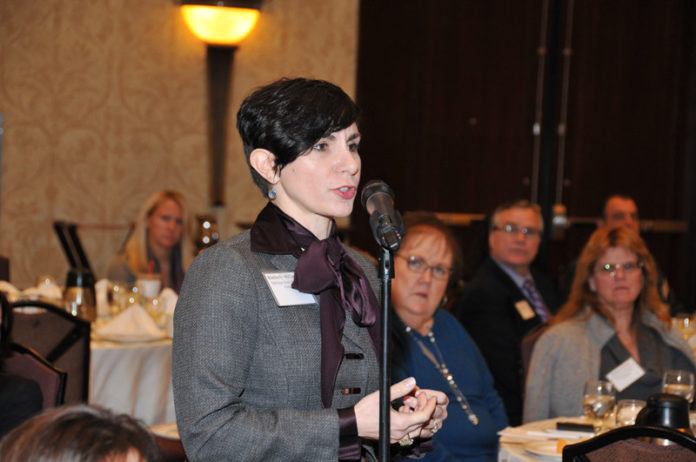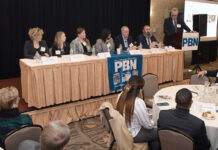
Empowerment as women corporate leaders can be achieved not only by breaking down existing barriers but by getting past one’s own limits and challenges and seeking out support.
That was the message that “Corporate Leadership,“ the first of two panels, conveyed on Dec. 4 at “Leadership and Entrepreneurship,” the Providence Business News summit on women at the Crowne Plaza Providence-Warwick.
Embracing complexity and executing goals may mean being different, “stepping on toes,” and challenging the status quo, but those things are important to do to make a mark and advance, panelists said. This also means dealing with personal, internal struggles effectively, like facing risks and controlling anger, one of the issues addressed during audience participation.
“I never show anger in the workplace, but sometimes I think I should,” said Kimberly McCarthy, a partner at Partridge, Snow & Hahn and part of an audience of 220. “How do you deal with that?”
The panel ended up addressing the full scope of the potential problem – from what to do if a subordinate or colleague gets angry to whether a professional should show anger when disappointed in a subordinate’s performance.
When anger is expressed by someone else, advised panelist Dr. Latha Sivaprasad, senior vice president and chief medical officer at Rhode Island Hospital and Hasbro Children’s Hospital, “I say, ‘I’m going to give you five minutes to collect yourself.’ When things get too emotional you cannot get emotional back; you must have a corporate face and stay stable.”
Marcia Cone, another panelist and founding executive of the Women’s Fund who now runs her own consulting business, suggested marshaling composure.
“Communicate in a way that can be heard,” Cone said. “It’s about being the adult in the room.”
That’s when Hope Global President and CEO Cheryl Merchant decided to tell a story – one of several from panelists that captivated the crowd.
Her worst experience, Merchant said, was when a boss was angry with her, but instead of expressing that anger, looked at her and said calmly, without swearing or raising his voice, “I cannot believe you let me down.”
“Let me tell you,” Merchant confided to the entire room, “I imagine he wanted to kill me for what I’d just done. But control is so much more effective.”
Deborah Thomas, Hasbro, Inc. executive vice president and chief financial officer, added, “If you maintain your cool and composure, people will recognize the fact that you’re not the one making the mistake … and see you as the bigger person.”
Anecdotes abounded during the morning meeting, which started with advice about perseverance and confidence from Elizabeth Myers, a partner with Verrill Dana LLP, a presenting sponsor.
“If you push through your feeling of being scared and take risks, amazing things can happen,” she said.
“We’re here because we know that organizations that have shared leadership outperform those that struggle with shared leadership,” added Renee Aloisio, chief operating officer and partner with presenting sponsor LGC+D Leveraged Solutions.
Cone addressed statistics that show progress remains slow in putting women at the helm of corporations. Compiled annually, the latest statistics at Fortune 500 companies show women held 5.2 percent of all CEO positions in 2014, according to a recent study by Catalyst, a company that researches gender equality, talent and leadership.
“What you measure becomes what you’re accountable for,” Cone said.
Merchant told of a job she advertised for a senior vice president of business development. She got 150 resumes in two weeks – not one of them from a woman.
“If you’re looking at ‘job experience’ and it says you need 15 years’ experience and you only have 12, so what: rock the boat [and apply anyway],” she said. Make the case that the company needs you in other ways.
Panelists’ recommendations about what to do to counter gender inequality included sharing information; promoting one’s accomplishments; collaborating; delegating; not being afraid to “not fit,” be different, or take risks; and being direct and assertive.
In describing her journey from wanting to be a corporate lawyer to finding her niche in corporate finance, Thomas discovered her strength is in simplifying complicated information.
“Look at what your strength [is] and let that move you forward in your career,” she said.
Despite the challenges of gender inequality, Susan Foley, managing partner of Corporate Entrepreneurs LLC, noted that focusing on the work often solves that potential problem.
“I never worried about equal pay [for equal work] because [bosses] were looking for results,” Foley said. “And when I provided results, the money came.” •












